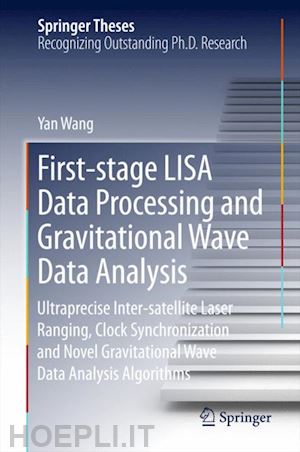
Questo prodotto usufruisce delle SPEDIZIONI GRATIS
selezionando l'opzione Corriere Veloce in fase di ordine.
Pagabile anche con Carta della cultura giovani e del merito, 18App Bonus Cultura e Carta del Docente
This thesis covers a diverse set of topics related to space-based gravitational wave detectors such as the Laser Interferometer Space Antenna (LISA). The core of the thesis is devoted to the preprocessing of the interferometric link data for a LISA constellation, specifically developing optimal Kalman filters to reduce arm length noise due to clock noise. The approach is to apply Kalman filters of increasing complexity to make optimal estimates of relevant quantities such as constellation arm length, relative clock drift, and Doppler frequencies based on the available measurement data. Depending on the complexity of the filter and the simulated data, these Kalman filter estimates can provide up to a few orders of magnitude improvement over simpler estimators. While the basic concept of the LISA measurement (Time Delay Interferometry) was worked out some time ago, this work brings a level of rigor to the processing of the constellation-level data products.
The thesis concludes with some topics related to the eLISA such as a new class of phenomenological waveforms for extreme mass-ratio inspiral sources (EMRIs, one of the main source for eLISA), an octahedral space-based GW detector that does not require drag-free test masses, and some efficient template-search algorithms for the case of relatively high SNR signals.
Yan Wang received his Ph.D. in 2009 at Albert-Einstein-Institut Hannover (Max-Planck-Institut fuer Gravitationsphysik). Since 11/2014 he has been working as research assistant professor, School of Physics, University of Western Australia. He's the winner of the 2014 Stefano Braccini Thesis Prize awarded by the Gravitational Wave International Committee.











Il sito utilizza cookie ed altri strumenti di tracciamento che raccolgono informazioni dal dispositivo dell’utente. Oltre ai cookie tecnici ed analitici aggregati, strettamente necessari per il funzionamento di questo sito web, previo consenso dell’utente possono essere installati cookie di profilazione e marketing e cookie dei social media. Cliccando su “Accetto tutti i cookie” saranno attivate tutte le categorie di cookie. Per accettare solo deterninate categorie di cookie, cliccare invece su “Impostazioni cookie”. Chiudendo il banner o continuando a navigare saranno installati solo cookie tecnici. Per maggiori dettagli, consultare la Cookie Policy.